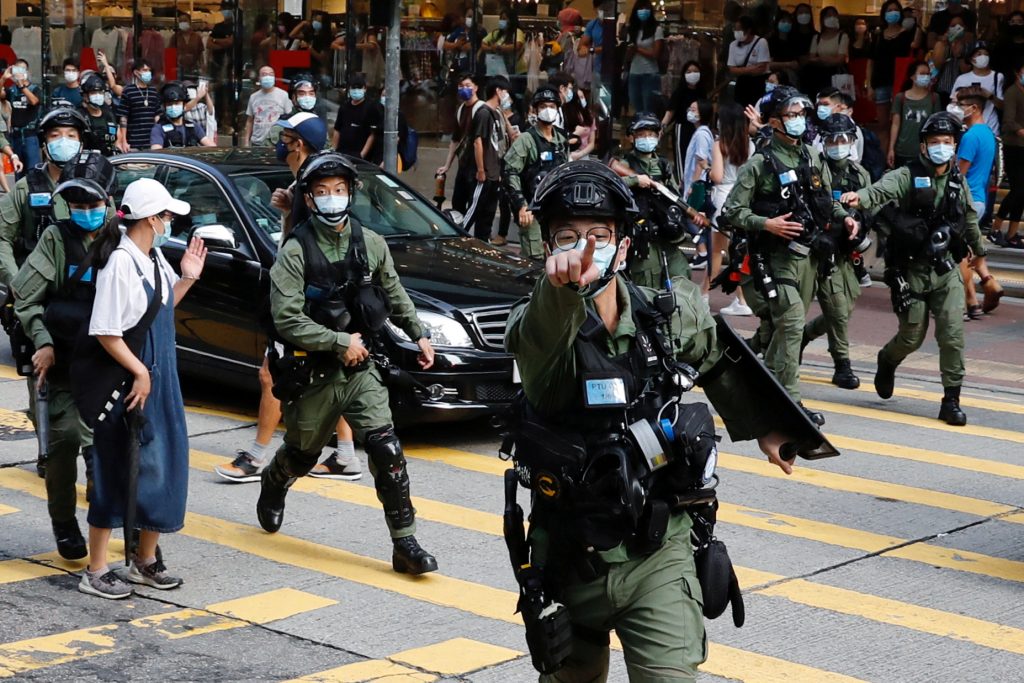Hong Kong’s future on edge: Countering China’s national security law
Over the past seventy-five years, the United States and its allies have constructed and defended a rules-based international system that has provided unprecedented levels of peace, prosperity, and freedom. In recent years, the system has come under increasing strain, as a new era of great power competition has emerged. Despite hopes that China would become a “responsible stakeholder” in a rules-based system, Beijing has grown increasingly assertive, especially under President Xi Jinping. Beijing’s more confrontational path poses a significant challenge to a rules-based system. The challenge presented by China is particularly acute in the context of Hong Kong, where the Chinese Communist Party (CCP) has brashly violated an international treaty and curtailed democratic institutions and human rights.
As the world enters an era of strategic competition with China, Beijing’s actions in Hong Kong should be a priority for policymakers in the United States and allied countries. This report addresses the importance of Hong Kong within the context of China’s broader challenge to the rules-based system and offers recommendations for how the United States and its allies can prevent a further erosion of democracy in Hong Kong and, over time, seek to restore it. It suggests that the United States and its allies still have available a range of pragmatic policy tools that can can be used to exert pressure and impose meaningful costs on Beijing. These should be implemented as part of a broader, comprehensive strategy to prevent China from undermining the rules-based system in the security, economic, and governance domains.
On June 30, 2020, the CCP imposed a sweeping new National Security Law on Hong Kong, effectively giving Beijing direct control over the autonomous territory. Since then, China has acted to erode Hong Kong’s liberal traditions, in violation of Beijing’s treaty commitments under the Sino-British Joint Declaration. The National Security Law has for all practical purposes outlawed democratic activism, organizing, and speech. Over the past year, Beijing has cracked down on Hong Kong’s democratic institutions and thrown the pro-democracy movement into disarray.
Beijing’s crackdown in Hong Kong is aimed at achieving several objectives. First, China’s leaders seek to maintain the legitimacy of the CCP in the face of a pro-democracy movement that it fears could spread to the mainland. Second, they seek to advance the unification of China by harmonizing the cultural, social, and economic aspects of life across the country, including Hong Kong. Third, the CCP aims to achieve a comprehensive modernization of China, while retaining the Party’s leadership, including by reaping economic benefits from the Greater Bay Area Integration Plan. Finally, China’s crackdown is aimed at stemming the advance of a liberal, democratic world order by pushing back on democratic norms that it views as antithetical to the Party and a danger to its efforts to modernize China on its own terms.
The United States and its allies must take further actions to push back on Beijing’s crackdown in Hong Kong. The ultimate objective of these actions is to achieve a state whereby Beijing, consistent with its treaty commitments, restores a greater degree of autonomy and democracy in Hong Kong.
The United States and its democratic allies have wide-ranging interests in preserving Hong Kong’s democratic institutions. The first is to advance a rules-based order that preserves democratic norms and protects human rights. Relatedly, the United States has a longstanding interest in supporting international law, which has been undermined by China’s violation of the Sino-British Joint Declaration. In addition, the United States and its allies have significant economic interests in Hong Kong, especially given the large number of Western firms and employees in the city. Finally, the fate of Hong Kong is linked to that of Taiwan, which the United States and its allies have had a clear long standing interest in defending. More generally, the United States and its allies have a stake in countering China’s actions in Hong Kong as part of a broader strategy to defend the rules-based system against Beijing’s efforts to undermine it.
Since the imposition of the National Security Law, the United States and its allies have responded through a variety of policy actions including statements of condemnation, sanctions, and the suspension of extradition treaties with Hong Kong. But the impacts of these measures have been limited. The United States and its allies must take further actions to push back on Beijing’s crackdown in Hong Kong. The ultimate objective of these actions is to achieve a state whereby Beijing, consistent with its treaty commitments, restores a greater degree of autonomy and democracy in Hong Kong. By holding Beijing accountable and imposing costs for its actions, the United States and its allies should seek to deter further transgressions within Hong Kong and, with sustained, coordinated action, aim to roll back the National Security Law over time.

The report describes several Tier One actions that can be taken by the United States and its allies to amplify the current policy framework with regard to Hong Kong. This includes actions to (i) expose and condemn illicit Chinese behavior in Hong Kong; (ii) counter Beijing’s narrative surrounding Hong Kong; (iii) expand democracy assistance for civil society groups; (iv) use sanctions to punish the CCP and its proxies for treaty violations; and (v) provide safe haven for Hongkongers.
In addition, the report suggests consideration of Tier Two actions that would entail elevating Hong Kong as a higher priority in relations between the China and the West. This could include conditioning the resumption of normal relations with China on the restoration of Hong Kong’s democracy, similar to the way in which improved relations with Russia have been conditioned on a withdrawal from Crimea. The United States, along with allies and partners could also seek to link, in certain respects, China’s unfettered access to Western markets and with its adherence to its treaty commitments on human rights and democracy in Hong Kong. While these actions could result in escalatory counter-measures by Beijing, they merit consideration as part of a broader strategy to address China’s challenge to the rules-based order.

